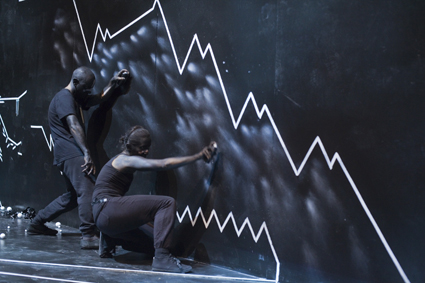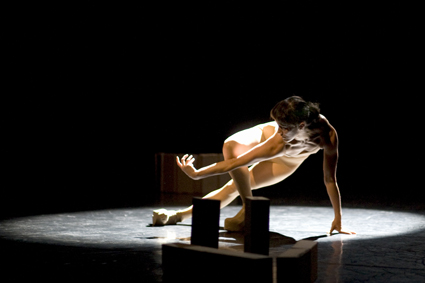melded minds & bodies
john bailey: antony hamilton & melanie lane, clouds over berlin

Antony Hamilton, Melanie Lane, Black Project 1
photo Ponch Hawkes
Antony Hamilton, Melanie Lane, Black Project 1
IS THERE ANY AUSTRALIAN CHOREOGRAPHER WITH A PHYSICAL GRAMMAR AS DISTINCTIVE AS ANTONY HAMILTON?
Not that he’s the most original shapemaker or that he hasn’t absorbed the influences of many of his peers and mentors. But there’s no-one quite like Hamilton, for both better and worse. He’s pursued a particular method of pop-and-lock staccato, freeze-and-reverse repetition and an organic/mechanic blurring so rigorously and for so long that not only has it become a signature, it’s become one that no-one else can forge. It always makes for compelling viewing when he’s demonstrating the results of his investigations, but when he choreographs on others they can never quite match the man himself.
Thankfully in Hamilton’s collaboration with Melanie Lane, the double bill Clouds Over Berlin, he seems to have melded minds with someone developing an art equally as striking. In Hamilton’s Black Project 1, Lane is still at times a nanosecond away from matching his stop-start brilliance, but in her own Tilted Fawn she delivers an experience quite unlike the various threads that have been woven through Australian choreography of the last decade.
There’s a mythic quality to the work which reveals itself coyly, and it’s as cool and inhuman as true myths always end up being. The audience sits in the round, bordering a space populated only by a few dozen cardboard bricks the size of shoeboxes. Lane methodically shifts and stacks and shuffles these, her movements concise and efficient enough to allow the inert objects as much presence as her own body. But gradually the onlookers become positioned as insubstantial gods watching the accelerated architectonics of human activity, each new structural formation engendering new associations. Stonehenge, a highrise ghetto, a walled estate, the Twin Towers? Sounds begin to emerge from the tiny edifices: music, whispers, conflict. The referents are never made explicit but it’s hard not to fashion your own interpretation of each configuration presented, and the cold, closed nature of these depictions subtly shifts its audience into a position of meditative spectatorship that allows us to forget our own corporeality.

Melanie Lane, Tilted Fawn
photo Maik Reichert
Melanie Lane, Tilted Fawn
Then Lane returns as a violent, excessive vision of that vanquished bodily reality, clad in a pale and featureless skinsuit with elongated hooves that cause her to stagger across the space. The wildness of her motion extends so extremely in all dimensions that it’s almost overpowering, and the constant collapse of each ankle isn’t just resonant with the image of the tottering newborn fawn but conjures a whole species of flailing, howling, confused beings up till now sublimated by the fairy village of urban planning.
Life remains absent from Black Project 1, however. Hamilton and Lane appear as gleaming black wraiths making their way across a post-urban wasteland. It’s a vision that gestures to the choreographer’s earlier interests—aerosol art, digital tech, breakdance—while stripping away any literal referents. The dance itself may be Hamilton’s most developed and sustained exploration of his own practice; certainly, its realisation occurs in a set and lighting state that is as immediately impactful as any I can recall. It’s less curious, perhaps even less generous than Lane’s effort, but in tandem the pair make for a bewitching penumbral experience both stirring and unsettling.
Read another review of Tilted Fawn at Perth’s Fringe World on page 7.
Clouds over Berlin: Tilted Fawn, choreography, concept, performer Melanie Lane, sound composition, installation Chris Clark, artistic collaboration Morgan Belenguer, dramaturgy Bart van der Eynde, costume, props Melanie Lane, lighting design Max Stelzl; Black Project 1, choreography, concept, design Antony Hamilton, peformers Antony Hamilton, Melanie Lane, video projection Olaf Meyer, music Robert Henke, Vainio and Fennesz, costumes Antony Hamilton; Arts House, North Melbourne Town Hall, March 7-11
RealTime issue #108 April-May 2012 pg. 25






